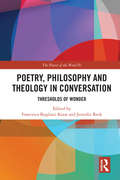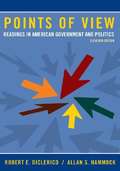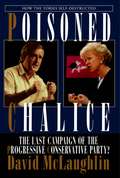- Table View
- List View
Poetics (SparkNotes Philosophy Guide)
by SparkNotesPoetics (SparkNotes Philosophy Guide) Making the reading experience fun! SparkNotes Philosophy Guides are one-stop guides to the great works of philosophy–masterpieces that stand at the foundations of Western thought. Inside each Philosophy Guide you&’ll find insightful overviews of great philosophical works of the Western world.
Poetics before Plato: Interpretation and Authority in Early Greek Theories of Poetry
by Grace M. LedbetterCombining literary and philosophical analysis, this study defends an utterly innovative reading of the early history of poetics. It is the first to argue that there is a distinctively Socratic view of poetry and the first to connect the Socratic view of poetry with earlier literary tradition. Literary theory is usually said to begin with Plato's famous critique of poetry in the Republic. Grace Ledbetter challenges this entrenched assumption by arguing that Plato's earlier dialogues Ion, Protagoras, and Apology introduce a distinctively Socratic theory of poetry that responds polemically to traditional poets as rival theorists. Ledbetter tracks the sources of this Socratic response by introducing separate readings of the poetics implicit in the poetry of Homer, Hesiod, and Pindar. Examining these poets' theories from a new angle that uncovers their literary, rhetorical, and political aims, she demonstrates their decisive influence on Socratic thinking about poetry. The Socratic poetics Ledbetter elucidates focuses not on censorship, but on the interpretation of poetry as a source of moral wisdom. This philosophical approach to interpreting poetry stands at odds with the poets' own theories--and with the Sophists' treatment of poetry. Unlike the Republic's focus on exposing and banishing poetry's irrational and unavoidably corrupting influence, Socrates' theory includes poetry as subject matter for philosophical inquiry within an examined life. Reaching back into what has too long been considered literary theory's prehistory, Ledbetter advances arguments that will redefine how classicists, philosophers, and literary theorists think about Plato's poetics.
Poetics of Alterity: Education, Art, Politics (Journal of Philosophy of Education)
by Soyoung LeePOETICS OF ALTERITY Education today is commonly oriented towards citizenship and skills for life, with aims of happiness and wellbeing. But this benign image harbours surreptitious forms of control, which ultimately undermine the goods it professes to safeguard and stifle education’s very purpose. What release can there be from these constrictions? Release is to be found, as Soyoung Lee eloquently shows, by attending to elements of experience that seem to escape our grip, from challenging aspects of our moral lives to struggles over practicalities of curriculum content. The more robust, more outward-turning orientation she demonstrates emphasises engagement with subject-matter, with problems and forms of narrative, that defy pre-determined formulations and categories. This requires turning towards objects worthy of attention and towards people and their claims on us. The arts and the humanities have special importance as spaces where alterity presents and expresses itself. Lee’s dialogue with Heidegger, Levinas, Derrida, and Celan shows how acknowledgement of the other must condition not only practices of teaching and learning but practicalities of our social and political lives. Attending to anxieties inherent in teaching and learning, in school and the wider world, the book’s powerful rationale for the curriculum provides nothing less than a new grounding for the humanities.
Poetics of History: Rousseau and the Theater of Originary Mimesis
by Philippe Lacoue-LabartheRousseau’s opposition to the theater is well known: Far from purging the passions, it serves only to exacerbate them, and to render them hypocritical. But is it possible that Rousseau’s texts reveal a different conception of theatrical imitation, a more originary form of mimesis? Over and against Heidegger’s dismissal of Rousseau in the 1930s, and in the wake of classic readings by Jacques Derrida and Jean Starobinski, Lacoue-Labarthe asserts the deeply philosophical importance of Rousseau as a thinker who, without formalizing it as such, established a dialectical logic that would determine the future of philosophy: an originary theatricality arising from a dialectic between “nature” and its supplements.Beginning with a reading of Rousseau’s Discourse on Inequality, Lacoue-Labarthe brings out this dialectic in properly philosophical terms, revealing nothing less than a transcendental thinking of origins. For Rousseau, the origin has the form of a “scene”—that is, of theater. On this basis, Rousseau’s texts on the theater, especially the Letter to d’Alembert, emerge as an incisive interrogation of Aristotle’s Poetics. This can be read not in the false and conventional interpretation of this text that Rousseau had inherited, but rather in relation to its fundamental concepts, mimesis and katharsis, and in Rousseau’s interpretation of Greek theater itself. If for Rousseau mimesis is originary, a transcendental structure, katharsis is in turn the basis of a dialectical movement, an Aufhebung that will translate the word itself (for, as Lacoue-Labarthe reminds us, Aufheben translates katharein). By reversing the facilities of the Platonic critique, Rousseau inaugurates what we could call the philosophical theater of the future.
Poetics of Music in the Form of Six Lessons (The Charles Eliot Norton lectures ; #1939-1940)
by Igor StravinskyTimeless lessons on the pleasures of listening, the dilemmas of composition, and the meaning of artistic freedom from a founder of musical modernism.In October 1939, Igor Stravinsky took the stage at Harvard not as a conductor but as a speaker. Invited to deliver the prestigious Norton Lectures, he had departed Europe just days after the outbreak of war, leaving behind not only a growing political maelstrom but also his life in France, where his wife, eldest daughter, and mother all had died in the previous year.Poetics of Music offers a snapshot of this pivotal moment in the composer’s biography and career. Delivered at the height of his neoclassical period, which blended the sculptural precision of classicism with distinctively twentieth-century cadences, Stravinsky’s lectures explore both the creative potential and the constraints of tradition. Though he achieved artistic immortality as a genre-defying experimentalist who scandalized audiences in Belle Époque Paris, the Stravinsky we find here is more circumspect, defending the dignity of formal conventions against the more anarchic currents of modernist experimentation. Tradition, he argues, is not a relic of a bygone past but a living force that animates the present. And true artistic freedom emerges not only in moments of revolutionary inspiration but also through strict deference to the formal requirements of the work.Like his compositions, Stravinsky’s lectures are ambitious and at times bombastic, punctuated by wit and polemic. Ranging widely from the phenomenology of rhythm to the fate of high culture in the Soviet Union, he invites us to reflect on what it is in music that compels us, whether we are hearing one of his polytonal works or a simple birdsong.
Poetics of the Earth: Natural History and Human History (Routledge Explorations in Environmental Studies)
by Augustin BerquePoetics of the Earth is a work of environmental philosophy, based on a synthesis of eastern and western thought on natural and human history. It draws on recent biological research to show how the processes of evolution and history both function according to the same principles. Augustin Berque rejects the separation of nature and culture which he believes lies at the root of the environmental crisis. This book proposes a three stage process of "re-worlding" (moving away from the individualized self to become a part of the common world), "re-concretizing" (understanding the meaning and historical development of words and things) and "re-engaging" (reconsidering the relationship between history and subjectivity at every level of being) in order to bring western thought on nature and culture into sustainable harmony and alignment. This book will be of great interest to students and scholars of environmental studies, environmental philosophy, Asian studies and the natural sciences.
Poetics: with the Tractatus Coislinianus, reconstruction of Poetics II, and the fragments of the On Poets
by Aristotle Richard JankoRichard Janko's acclaimed translation of Aristotle's Poetics is accompanied by the most comprehensive commentary available in English that does not presume knowledge of the original Greek. Two other unique features are Janko's translations with notes of both the Tractatus Coislinianus, which is argued to be a summary of the lost second book of the Poetics, and fragments of Aristotle's dialogue On Poets, including recently discovered texts about catharsis, which appear in English for the first time.
Poetry and Power of Judgment: The Aesthetic Unity of Chinese Classical Poetry
by Song YeThis book examines Chinese traditional poetry with an emphasis on the sources of pleasure in creating and appreciating classical Chinese poems and the basis for valid aesthetic judgments about poetry.The pleasure derived from art plays a crucial role in people’s evaluation of its worth. This book shows that Chinese classical poetics and Western aesthetics agree on the sources of aesthetic pleasure. Both hold, despite their obvious differences, that aesthetic taste essentially involves cognition. The book explores important ideas in traditional Chinese poetry, emphasizing that “Poetry is founded upon the power of judgement (shi).” This central idea guides other key concepts throughout the history of Chinese poetics, revealing the fundamental principles of creating and appreciating poetic art. The author presents new views of traditional Chinese poetry and poetics by unifying these long-dispersed basic propositions into a new coherent cognitivist framework that also gives due importance to emotion.Scholars and students studying Chinese literature, poetics, philosophy of art, and philosophy of mind will find this book interesting.
Poetry and Prayer: The Power of the Word II (The Power of the Word)
by Francesca Bugliani Knox John TookInterdisciplinary and ecumenical in scope, Poetry and Prayer offers theoretical discussion on the profound connection between poetic inspiration and prayer as well as reflection on the work of individual writers and the traditions within which they stand. An international range of established and new scholars in literary studies and theology offer unique contributions to the neglected study of poetry in relation to prayer. Part I addresses the relationship of prayer and poetry. Parts II and III consider these and related ideas from the point of view of their implementation in a range of different authors and traditions, offering case studies from, for example, the Bible, Dante, Shakespeare and Herbert, as well as twentieth-century poets such as Thomas Merton, Denise Levertov, W.H. Auden and R.S. Thomas.
Poetry and Song in Late Eighteenth Century Germany: A Study in the Musical Sturm Und Drang (Routledge Revivals)
by Margaret Mahony StoljarThe German Lied in the period preceding Mozart is less well-known than that of the florescence under Schubert, Schumann and Wolf. But in Poetry and Song in Late Eighteenth Century Germany (originally published in 1985) Margaret Stoljar shows that the songs composed by C.P.E. Bach and his contemporaries have an interest and allure of their own. She concentrates her analysis on the interplay of poets and musicians, the use made by composers of the work of such distinguished poets as Klopstock, and the specific contribution that music was able to make to the reception of the poetry.As much a work of social history as of musicology, Poetry and Song in Late Eighteenth Century Germany casts a fascinating light on the leisure of the period and place, as well as on the development of taste and sensibility that prepared the way for Young Werther. The book is illustrated with examples of music.
Poetry and the Question of Modernity: From Heidegger to the Present (Routledge Studies in Contemporary Literature)
by Ian CooperInterest in Martin Heidegger was recently reawakened by the revelations, in his newly published ‘Black Notebooks’, of the full terrible extent of his political commitments in the 1930s and 1940s. The revelations reminded us of the dark allegiances co-existing with one of the profoundest and most important philosophical projects of the twentieth century—one that is of incomparable importance for literature and especially for poetry, which Heidegger saw as embodying a receptiveness to Being and a resistance to the instrumental tendencies of modernity. Poetry and the Question of Modernity from Heidegger to the Present is the first extended account of the relationship between Heidegger’s philosophy and the modern lyric. It argues that some of the best-known modern poets in German and English, from Paul Celan to Seamus Heaney and Les Murray, are in deep imaginative affinity with Heidegger’s enquiry into finitude, language, and Being. But the work of each of these poets challenges Heidegger because each appeals to a transcendence, taking place in language, that is inseparable from the motion of encounter with embodied others. It is thus poetry which reveals the full measure of Heidegger’s relevance in redefining modern selfhood, and poetry which reveals the depth of his blindness.
Poetry from the Future: Why a Global Liberation Movement Is Our Civilisation's Last Chance
by Srecko Horvat'A compelling vision, an urgent necessity, and not beyond reach' Noam ChomskyThe past is forgotten, and the future is without hope. Dystopia has become a reality. This is the new normal in our apocalyptic politics - but if we accept it, our helplessness is guaranteed. To bring about real change, argues activist and political philosopher Srecko Horvat, we must first transform our mindset.Ranging through time and space, from the partisan liberation movements of Nazi-occupied Yugoslavia to the contemporary culture, refugee camps and political frontlines of 21st century Europe, Horvat shows that the problems we face today are of an unprecedented nature. To solve them, he argues in this passionate call for a new radical internationalism, we must move beyond existing ways of thinking: beyond borders, national identities and the redundant narratives of the past. Only in this way can we create new models for living and, together, shape a more open and optimistic future.
Poetry, Language, Thought (Harper Perennial Modern Thought Ser.)
by Martin HeideggerPoetry, Language, Thought collects Martin Heidegger's pivotal writings on art, its role in human life and culture, and its relationship to thinking and truth. Essential reading for students and anyone interested in the great philosophers, this book opens up appreciation of Heidegger beyond the study of philosophy to the reaches of poetry and our fundamental relationship to the world. Featuring "The Origin of the Work of Art," a milestone in Heidegger's canon, this enduring volume provides potent, accessible entry to one of the most brilliant thinkers of modern times.
Poetry, Performativity, and Ordinary Language Philosophy
by Philip MillsHow can Ordinary Language Philosophy (OLP) help us understand poetry? Against John L. Austin’s exclusion of poetic utterances as parasitical, Philip Mills explores how contemporary poetics broadens the aims and scope of OLP. Through the analysis of French and American poetry that reinterprets notions such as illocution, perlocution, and language-games, Mills develops a poetic philosophy of language, revealing its viral and transformative nature. Poetry, Performativity, and Ordinary Language Philosophy bridges philosophy and poetry, showing how poetry contaminates and reshapes our ways of thinking and being in the world, and combining the poetic and the ethical in the notion of ‘poethics.’ This Open Access book offers a new perspective on the poetic and literary potential of OLP and the intersections between the philosophy of language and poetry.
Poetry, Philosophy and Theology in Conversation: Thresholds of Wonder: The Power of the Word IV
by Jennifer Reek Francesca Bugliani KnoxThis volume is a collection of essays that explains how literature, philosophy and theology have explored the role of wonder in our lives, particularly through poetry. Wonder has been an object of fascination for these disciplines from the Greek antiquity onwards, yet the connections between their views on the subject are often ignored in subject specific studies. The book is divided into three parts: Part I opens the conversation on wonder in philosophy, Part II is given to theology and Part III to literary perspectives. An international set of contributors, including poets as well as scholars, have produced a study that looks beyond traditional chronological, geographical and disciplinary boundaries, both within the individual essays themselves and in respect to one another. The volume’s wide historical framework is punctuated by four poems by contemporary poets on the theme of wonder. An unconventional foray into one of the best-known themes of the European tradition, this book will be of great interest to scholars of literature, theology and philosophy.
Poets of the Chinese Revolution: Chen Duxiu, Zheng Chaolin, Chen Yi, Mao Zedong
by Mao Tse-Tung Chen Yi Chen DuxiuHow poetry and revolution meshed in Red ChinaThe Chinese Revolution, which fought its way to power seventy years ago, was a complex and protracted event in which groups and individuals with different hopes and expectations for the Revolution competed, although in the end Mao came to rule over the others. Its veterans included many poets, four of whom feature in this anthology. All wrote in the classical style, but their poetry was no less diverse than their politics. Chen Duxiu, led China’s early cultural awakening before founding the Communist Party in 1921. Mao led the Party to power in 1949. Zheng Chaolin, Chen Duxiu’s disciple and, like him, a convert to Trotskyism, spent thirty-four years in jail, first under the Nationalists and then under their Maoist nemeses. The guerrilla leader Chen Yi wrote flamboyant and descriptive poems in mountain bivouacs or the heat of battle.Poetry has played a different role in China, and in Chinese Revolution, from in the West—it is collective and collaborative. But in life, the four poets in this collection were entangled in opposition and even bitter hostility towards one another. Together, the four poets illustrate the complicated relationship between Communist revolution and Chinese cultural tradition.
Poincare's Prize: The Hundred-Year Quest to Solve One of Math's Greatest Puzzles
by George G. SzpiroThe amazing story of one of the greatest math problems of all time and the reclusive genius who solved itIn the tradition of Fermat's Enigma and Prime Obsession, George Szpiro brings to life the giants of mathematics who struggled to prove a theorem for a century and the mysterious man from St. Petersburg, Grigory Perelman, who fi nally accomplished the impossible.<P><P> In 1904 Henri Poincaré developed the Poincaré Conjecture, an attempt to understand higher-dimensional space and possibly the shape of the universe. The problem was he couldn't prove it. A century later it was named a Millennium Prize problem, one of the seven hardest problems we can imagine. Now this holy grail of mathematics has been found.Accessibly interweaving history and math, Szpiro captures the passion, frustration, and excitement of the hunt, and provides a fascinating portrait of a contemporary noble-genius.
Pointing at the Moon
by Alexander HolsteinPointing at the Moon comprises one hundred brilliant examples of the Ch'an masters' questions and answers from the following four treatises of the Ch' an tradition: A Selection From the Five Books of the Ch 'an Masters' Sayings, The Light of the Ch 'an Sayings Recorded in the Year if Developing Virtue (A.D. 1004), The Ch'an Sayings Recorded During the Moonlit Meditation, and An Anthology if Ch'an Sayings,
Pointing at the Moon
by Alexander HolsteinPointing at the Moon comprises one hundred brilliant examples of the Ch'an masters' questions and answers from the following four treatises of the Ch' an tradition: A Selection From the Five Books of the Ch 'an Masters' Sayings, The Light of the Ch 'an Sayings Recorded in the Year if Developing Virtue (A.D. 1004), The Ch'an Sayings Recorded During the Moonlit Meditation, and An Anthology if Ch'an Sayings,
Pointing at the Moon
by Alexander HolsteinThis collection of Zen koans with extensive commentary will be of great interests to followers of Zen Buddhism.People around the world value the mind-cleansing, spiritually uplifting benefit to be gained through the practice of Cha'an (Zen) Buddhism. Central to Zen is the enigmatic koan (kung-an), a kind of riddle used by masters to shock their students into greater awareness. In this timeless collection from Chinese masters, translations of 100 of these question-and-answer riddles are presented. Each koan is followed by the author's commentary, which provides fascinating insight into the background and deeper meanings of the koans.Pointing at the Moon contains zen koeans from the following four treatises of the Zen tradition: A Selection From the Five Books of the Zen Masters' Sayings The Light of the Zen Sayings Recorded in the Year if Developing Virtue The Zen Sayings Recorded During the Moonlit Meditation An Anthology if Zen SayingsEnhanced by the 85 beautifully sketched Chinese brush paintings, Pointing at the Moon is a text certain to stimulate and challenge anyone interested in learning more about Zen and its tradition of spiritual enlightenment.
Pointing the Way
by Martin Buber Maurice S. Friedman"These essays, written between 1909 and 1954 and first published as a collection in 1957, in which the eminent philosopher relates the 'I-Thou' dialogue to such varied fields as religion, social thought, philosophy, myth, drama, literature and art, reveal Buber in the process of responding to the crises and challenges of the 20th century and enable the reader to follow his lifelong struggles toward 'authentic existence.'" -Back Cover
Pointless: The Reality behind Quantum Theory
by RW BoyerThis book examines how major interpretations of quantum theory are progressing toward a more unified understanding and experience of nature. It offers subtle insights to address core issues of wave-particle duality, the measurement problem, the mind/body problem, determinism/indeterminism/free will, and the nature of consciousness. It draws from physics, consciousness studies, and ‘ancient Vedic science’ to outline a new holistic interpretation of quantum theory. Accessible and thought-provoking, it will be profoundly integrating for scholars and researchers in science and technology, in philosophy, and also in South Asian studies.
Points of View: Readings in American Government (11th Edition)
by Robert E. Diclerico Allan S. HammockThe eleventh edition of Points of View: Readings in American Government and Politics provides instructors and students with a manageable and accessible selection of readings that present succinct, thoughtful, and diverse perspectives across a broad range of issues in American Government today. This comprehensive reader features contrasting viewpoints on current political debates and traditional topics of interest in contemporary American Government courses. By providing two opposing positions for each topic, Points of View challenges students to examine and appreciate differing perspectives.
Poisoned Chalice: How the Tories Self-Destructed
by David MclaughlinPoisoned Chalice chronicles the fateful end of the federal Progressive Conservative government in Ottawa. The Progressive Conservative Party sought to remake itself by choosing the first woman prime minister in Canadian history, but failed to heed the lessons of Meech or Charlottetown. Their strategy nearly worked. By the time the election was called, the Tories were neck and neck with Jean Chrétien’s Liberals. Then it all fell apart. This book, published exactly one year after the event, tells how and why it happened. It gives a day-by-day account of an election campaign seemingly doomed to failure. It covers the strategy, tactics and political machinations that drove the Conservative campaign from the point of view of someone "on the bus." Read the strategy memos given to Kim Campbell. Listen in on her election-night phone call to Jean Chrétien. Relive Kim Campbell’s campaigh from one end of the country to the other. More than just that, Poisoned Chalice asks fundamental questions about how one of the founding political parties of Canada could come to such an ignominious state. Does the Progressive Conservative Party have a future? Has it been overtaken for good by Reform? This book takes the reader back to the seeds of the Tories’ defeat, from the constitutional debate and referendum, to the Conservative leadership race that never was, to Kim Campbell’s shining summer, to the electoral devastation of just two seats.
Poker and Philosophy: Pocket Rockets and Philosopher Kings
by Eric BronsonDoes God play cards with the universe? Do women have better poker faces than men? What's the most existential poker movie ever made? Is life more meaningful when you go all-in? Is online poker really still poker? <P><P>Poker and Philosophy ponders these questions and more, pitting young lions against old masters as the brashness of Phil Hellmuth meets the arrogance of Socrates, the recklessness of Doyle Brunson challenges the desperation of Dostoyevsky, and the coolness of Chris Moneymaker takes on the American tradition of capitalist ingenuity. This witty collection of essays demonstrates what serious card sharks have long known: winning big takes more than a good hand and a straight face. Stacking the metaphorical deck with a serious grounding in philosophy is the key to raking it in, because as Machiavelli proved long ago, it's a lot better to be feared than loved, and lying is not the same as cheating.

